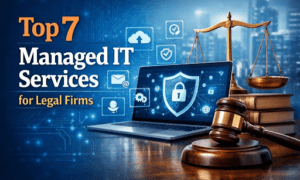In today’s fast-paced digital world, businesses rely heavily on technology to streamline operations, enhance productivity, and maintain a competitive edge. However, managing IT infrastructure can be complex and time-consuming, often diverting resources from core business activities. This is where Managed IT Services come in, offering businesses a cost-effective and proactive approach to IT management. By outsourcing IT functions to experts, businesses can increase efficiency, reduce downtime, enhance security, and improve overall productivity.
This article explores how Managed IT Services can help businesses operate more efficiently and why they are essential for modern enterprises.
1. Proactive IT Support and Maintenance
One of the biggest advantages of Managed IT Services is proactive monitoring and maintenance. Instead of waiting for a system failure or security breach to occur, Managed Service Providers (MSPs) continuously monitor networks, servers, and devices to identify and resolve potential issues before they impact business operations.
Benefits of Proactive IT Support:
- Reduced Downtime: Continuous monitoring ensures that potential IT issues are detected and resolved before they cause significant disruptions.
- Faster Problem Resolution: 24/7 support allows businesses to receive immediate assistance, reducing the time spent troubleshooting problems.
- Enhanced Performance: Regular maintenance keeps hardware and software running optimally, preventing slowdowns and inefficiencies.
2. Cost Efficiency and Predictable IT Expenses
Managing an in-house IT department can be expensive, requiring significant investments in staff salaries, training, hardware, and software. Managed IT Services offer a cost-effective alternative by providing access to a team of experts at a fixed monthly cost.
How Managed IT Services Reduce Costs:
- Eliminates the need for an in-house IT team, reducing salary and training expenses.
- Minimizes unexpected IT costs through a predictable subscription model.
- Reduces infrastructure costs by offering cloud solutions, eliminating the need for expensive on-premises servers and storage.
- Improves ROI by ensuring that technology investments align with business goals.
3. Strengthened Cybersecurity and Compliance
Cyber threats such as phishing attacks, ransomware, and data breaches are growing concerns for businesses of all sizes. Managed IT Services provide comprehensive security solutions to protect businesses from cyber risks and ensure compliance with industry regulations.
Key Security Features Offered by MSPs:
- Advanced Threat Detection and Prevention – Continuous monitoring helps identify and mitigate cyber threats before they cause harm.
- Data Encryption and Backup Solutions – Ensures data protection and business continuity in case of cyber incidents.
- Compliance Management – Helps businesses comply with regulations like GDPR, HIPAA, and SOC 2, avoiding costly fines and reputational damage.
- Employee Cybersecurity Training – Educates staff on best practices to prevent cyber attacks.
4. Enhanced Cloud Solutions and Remote Work Support
Cloud computing has transformed the way businesses operate by providing scalable, flexible, and cost-effective solutions. Managed IT Services help businesses migrate, manage, and optimize cloud infrastructure, ensuring seamless access to resources from anywhere.
How MSPs Improve Cloud and Remote Work Efficiency:
- Cloud Migration Services: Help businesses transition to cloud-based platforms like AWS, Microsoft Azure, or Google Cloud.
- Remote Workforce Support: Ensures employees can securely access business applications from anywhere.
- Data Synchronization: Provides real-time access to updated data, improving collaboration and decision-making.
- Backup and Disaster Recovery: Ensures that business data remains secure and retrievable in case of hardware failure or cyberattacks.
5. Improved IT Scalability and Flexibility
As businesses grow, their IT needs evolve. Managed IT Services allow companies to scale their IT infrastructure without significant capital investment.
How Managed IT Services Enable Scalability:
- On-Demand IT Resources: Businesses can easily scale up or down based on changing requirements.
- Flexible Pricing Models: Pay-as-you-go services eliminate the need for long-term capital investments.
- Access to Latest Technology: MSPs ensure that businesses use up-to-date hardware and software, keeping them ahead of the competition.
- Seamless Integration: Ensures that new software and hardware integrate smoothly with existing systems, minimizing disruptions.
6. Better Focus on Core Business Activities
Handling IT-related issues in-house can divert attention from core business operations. Managed IT Services allow businesses to focus on their primary goals while IT experts handle technology management.
Key Benefits:
- Frees up internal resources to focus on business growth and innovation.
- Reduces employee frustration by eliminating IT-related distractions.
- Provides access to specialized expertise, ensuring IT systems are optimized and managed efficiently.
- Enables strategic planning, as businesses can leverage MSP insights for IT roadmaps and future expansions.
7. Reliable Backup and Disaster Recovery
Data loss can cripple a business, leading to lost revenue, damaged reputation, and legal consequences. Managed IT Services offer comprehensive data backup and disaster recovery solutions, ensuring business continuity in case of emergencies.
Key Disaster Recovery Features:
- Automated Backup Solutions: Ensures critical business data is securely backed up in real time.
- Disaster Recovery Planning: Provides a roadmap for restoring operations quickly after system failures or cyberattacks.
- Cloud-Based Redundancy: Enables quick recovery of lost data and minimizes downtime.
- Testing and Updates: Ensures that disaster recovery plans remain effective and up-to-date.
8. Improved IT Compliance and Risk Management
Many industries require businesses to comply with strict regulatory and data protection standards. Managed IT Services help businesses maintain compliance and mitigate risks, reducing the chances of legal and financial penalties.
How MSPs Assist in Compliance Management:
- Conducting Regular IT Audits to identify vulnerabilities.
- Ensuring Data Encryption and Secure Storage in compliance with regulations.
- Providing Documentation and Reporting for audits and regulatory assessments.
- Implementing Security Protocols to meet industry-specific compliance needs.
Conclusion
Managed IT Services are a game-changer for businesses looking to enhance efficiency, reduce costs, and improve cybersecurity. By outsourcing IT management, businesses can focus on growth, ensure seamless operations, and stay ahead in the competitive digital landscape. From proactive IT maintenance and enhanced security to cloud optimization and disaster recovery, Managed IT Services provide the essential support businesses need to thrive.


































